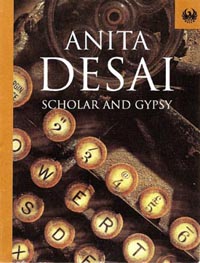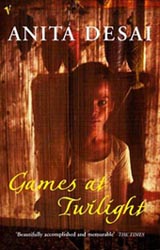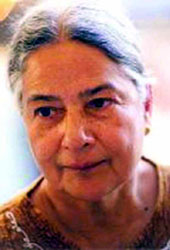Feb 23, 2026
Feb 23, 2026
Her first short story is titled 'Scholar and Gypsy'. This is a narrative about an American couple who visits Mumbai and then Manali. Anita has definitely drawn from her experience, the images drawn in its minutest detail would explain a watchful eye, a camera that records all of them and brings them back painted in words. No Indian author living in the west could write like this unless one has an Indian ethos having been born and lived in India. All of these are reflected in each of the short stories written by her. Mumbai to Pat was like this ' It began to seem to her that this was the chief occupation of people in Bombay ' going to parties. She was always on the point of collapse when she arrived at one: the taxi invariably stank; the driver's hair dripped oil, and then the sights and scenes they passed on the streets, the congestion and racket of the varied traffic, the virulent cinema posters, the blazing colors of women's clothing, the profusion of toys and decorations of colored paper and tinsel, the radios and loudspeakers never turned to less than top volume, and amongst them flower sellers, pilgrims, dancing monkeys and performing bears'.. that there should be such poverty, such disease, such filth, and that out of it boiled so much vitality, such irrepressible life, seemed to her unnatural and sinister ' it was as if chaos and evil triumphed over reason and order. Details about a high rise building and its elevator go like this ' Leaving behind them the betel-stained walls of the elevator shaft, the servant boys asleep on mats in the passage, the cluster of watchmen and chauffeurs playing cards under the unshaded bulbs in the lobby, they had stepped onto a black marble floor that glittered like a mirror and reflected the priceless statuary that sailed on its surface like ships of stone. Scarlet and vermilion ixora in pots. Manservants in stiffly starched uniform. Jewels, enamel, brocade and gold. The story moves us to Manali from Mumbai and Delhi where life turns out to be very different from the urban chaos. The bus travel from Delhi is described as a roller coaster ride not for the faint hearted - The bus crackled with sand, peanut shells and explosive sounds from the protesting engine. There was a stench of diesel oil, of vomit, of perspiration and stale food such as he had never believed could exist ' it was so thick. The bus was long past its prime but rattled, roared, shook and vibrated all the way through the desert, the plains, the hills, to Mandi where it stopped for a tea break in a rest house under some eucalyptus trees in which cicadas trilled hoarsely. Then it plunged, bent on suicide, into the Beas river gorge. It is at Manali that Pat found herself, within the rarified environs of high altitude temples, Buddhist stupas, and people converging from all over the world, seeking and perhaps finding what they had come for. Anita Desai takes us on a tour of such places and finally ending the story with a query that would haunt in separate ways to the Indian and the western mind. Curiosity about peanut butter took me to a quaint little wooden shack in the midst of an apple orchard. I knocked on the rough wooden door, to be soon opened by a smiling European woman. 'Yes, I am Patricia'. I could only say, 'Peanut Butter'? Patricia took me inside and opened a wooden box that contained bottles of Peanut butter. That was the first time I had ever set eyes on Peanut butter. Suddenly there was a commotion behind and I saw a bearded long haired Indian man entering the shack. He introduced himself as Peter. As I was making up my mind regarding the need of peanut butter, he casually asked me if I belonged to Uttar Pradesh. His Bengali accented English gave away his identity. I asked him casually in Bangla ' Kolkatar na ki' ' Are you from Kolkata'. He was flabbergasted. It was bonhomie time, bottles of peanut butter given to me as samples, much later he disclosed that his name is actually Partho Bannerjee but has changed his name to Peter for the convenience of everybody, including his girlfriend, Patricia. Patricia and Peter have been staying in Manali for a number of years. For Patricia from USA, this was a place she would live forever having found all the answers and Peter. Anita Desai's Pat also stayed back in Manali. Her final words to her husband as she bid good bye ' 'You, you don't even know it's possible to find Buddha in a Hindu temple. Why, you can find him in a church, a forest, anywhere. Do you think he is as narrow minded as you? The next story, Pineapple Cake takes us on the old world charm that Mumbai was at one time. The story revolves around a world that is quietly crashing; the deSouzas, deSilvas, Fernandez, Braganzas and deMellos find themselves enduring a life that has suddenly passed by. Victor is a boy, a nervous than a rebellious child who has been promised a pineapple cake by her mother Mrs. Fernandez. The pineapple cake is the ultimate luxury that the boy and his mother yearn. The story, pineapple cake takes us to the world of Goan Christians living in Bombay. They seem to be stuck in a limbo, with the world changing so fast around them. It was. Morning had stirred up some breeze off the sluggish river Jumna beneath the city walls, and it was carried over the rooftops of the stifled city, pale and fresh and delicate. It brought with it the morning light, as delicate and sweet as the breeze itself, a pure pallor unlike the livid glow of artificial lights. This lifted higher and higher into the dome of the sky, diluting the darkness there till it, too, grew pale and gradually shades of blue and mauve tinted it lightly. The old man lay flat and still, gazing up, his mouth hanging open as if to let it pour into him, as cool and fresh as water. Then, with a swirl and flutter of feathers, a flock of pigeons hurtled upwards and spread out against the dome of the sky ' opalescent, sunlit, like small pearls. Under the vast, early-dawn sky We must be patient, we told ourselves, It was at a Sunday flea market on the beach front in East London, South Africa that I came across Anita Desai's book of short stories, Scholar and Gypsy. My good friend Rob has a book shop every weekend in this market. He collects military medals and wears a Gurkha Regimental hat. Rob is well known for his collection of rare items, books, medals, coins and other exotic memorabilia. He knows about my great interest in Indian writings in English during the colonial and post colonial period and always keeps a stack of books for me. It was last week that I got this beautiful book written by Anita Desai from him. Its uniqueness would attract anybody, primarily because it looks like a small pocket book, 10 cms x 13 cms and has an alluring cover of an antique typewriter photographed by Nick Dolding. The paperback book has 59 pages and is published by Phoenix in 1996.
It was at a Sunday flea market on the beach front in East London, South Africa that I came across Anita Desai's book of short stories, Scholar and Gypsy. My good friend Rob has a book shop every weekend in this market. He collects military medals and wears a Gurkha Regimental hat. Rob is well known for his collection of rare items, books, medals, coins and other exotic memorabilia. He knows about my great interest in Indian writings in English during the colonial and post colonial period and always keeps a stack of books for me. It was last week that I got this beautiful book written by Anita Desai from him. Its uniqueness would attract anybody, primarily because it looks like a small pocket book, 10 cms x 13 cms and has an alluring cover of an antique typewriter photographed by Nick Dolding. The paperback book has 59 pages and is published by Phoenix in 1996. The book has three short stories, Scholar and Gypsy,Pineapple Cake and Pigeons at Daybreak. These short stories first appeared in Anita's book Games at Twilight and other stories published by William Heinemann in 1978. The short stories hold a special meaning to me as I recall with certain nostalgia, bitter sweet feelings in years gone by.
The book has three short stories, Scholar and Gypsy,Pineapple Cake and Pigeons at Daybreak. These short stories first appeared in Anita's book Games at Twilight and other stories published by William Heinemann in 1978. The short stories hold a special meaning to me as I recall with certain nostalgia, bitter sweet feelings in years gone by.  Anita Desai needs no introduction. Desai was born Anita Mazumdar to a German mother Toni Nime and a Bengali businessman, D.N. Mazumdar in Mussoorie, India. She grew up speaking German at home and Bengali, Urdu, Hindi and English outside the house. At present she is the John E. Burchard Professor of Humanities, Emeritus at the Massachusetts Institute of Technology USA. She has been short-listed for the prestigious Booker Award three times.
Anita Desai needs no introduction. Desai was born Anita Mazumdar to a German mother Toni Nime and a Bengali businessman, D.N. Mazumdar in Mussoorie, India. She grew up speaking German at home and Bengali, Urdu, Hindi and English outside the house. At present she is the John E. Burchard Professor of Humanities, Emeritus at the Massachusetts Institute of Technology USA. She has been short-listed for the prestigious Booker Award three times.
I have always wondered, how much would Anita Desai's work be fully understood to readers in the western world. It is just the same that I couldn't understand much of V.S. Naipaul's work in the seventies specially being an Indian living in India in my teens. His literature seemed alien to my sensibilities conditioned by Indian flavors. It's now only after having immigrated to South Africa that I can understand and feel the pathos in all his books especially in 'A House for Mr. Biswas'.
The seventies was the height of the flower children cults and hippies as they were known as came from all over the world, the hippie trail starting at Katmandu, Nepal in the narrow lanes of Freek Street and the Bakery reaching Manali and then finally ending at beaches of Goa. I went to Manali in 1978 and experienced a similar bus ride as told by Anita Desai. Manali and Kulu were filled with Hippies, the air thick with Hashish smoke and all night music and dancing was a regular spectacle.
It was during this period, I met some people whom I would always remember.
On one of the streets from my hotel to the bus stand, I found a tiny poster stuck on the stone pebbled wall, 'For Home made Peanut Butter, Meet Patricia and Peter'.
I felt that I was living in a big bungalow next to the sea; their bathrooms were as big as the living rooms. Its Christmas time again, Amitabh, Bad boy, you didn't come to take your piece of Christmas cake this time. It was Miss Joseph calling me. She had passed a long time back and my father very sick at home but still remembering its Christmas, trying to call me so that I can phone Miss Joseph. The year she passed away, she couldn't make the Christmas cake; she had lost her mind by then.
Pigeons at daybreak is a moving story. It is a story of the elderly suffering with chronic disease just waiting for an end. But that does not mean that they have lost the desire, the desire of dreaming and thinking all that was good. Mr. Basu is one such person who has chronic asthma, irritable because of his affliction yet daring to dream that one day he would walk with his grandchild.
I see people everyday with chronic diseases of the lung ranging from Asthma, tuberculosis and cancer. They can nether sleep nor lie, crying to be helped to be put in such a position where they can breathe. But in spite of all these when death arrives; suddenly there is such clarity of the mind. My father felt this clarity after years of emaciation. He told me about everything that he always wanted to tell me. Mr. Basu felt the same a few seconds before he passed away. All the nights huffing and puffing ended in the last few seconds when he suddenly felt so well. And then the pigeons flew off as they would always do at daybreak.
'Leave me alone,' he said again in that still voice. 'It is cool now'.
I remember these lines from a poem titled 'Pigeons at Dawn' written by Charles Simic. He is a Yugoslavian poet living in the U.S.A. Charles is a Professor of English at the University of New Hampshire.
The city lay silent before us.
Everything on hold:
Rooftops and water towers,
Clouds and wisps of white smoke.
See if the pigeons will coo now
For the one who comes to her window
To feed them angel cake,
All but invisible, but for her slender arm.
08-Apr-2007
More by : Dr. Amitabh Mitra